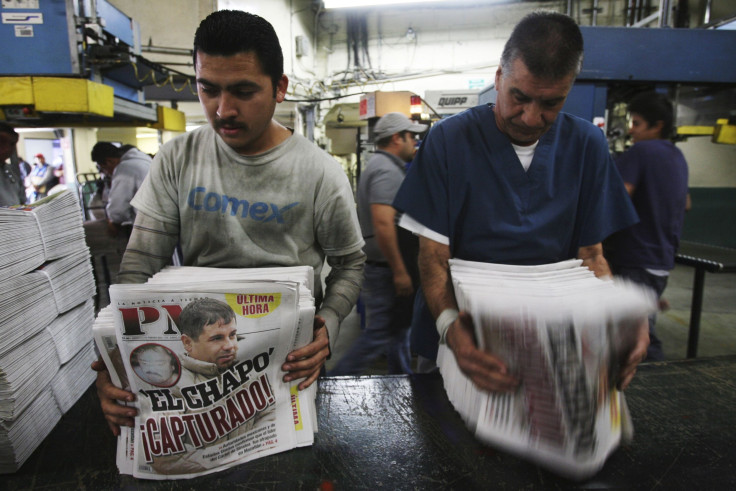How El Chapo Arrest Will Affect Mexican Economy; Tourism And Foreign Investment Expected To Increase

MEXICO CITY -- The arrest of drug lord Joaquín Guzmán Loera, “El Chapo,” the most wanted criminal in the world, has set Mexico into a frenzy. The capture, the outcome of a joint operation of U.S. and Mexican forces, brought warnings of caution that the war on drugs is certainly not over. But it also gave President Enrique Peña Nieto cause to celebrate a win against organized crime and a welcome boost for his administration.
Indeed, the arrest marks an end to an era of criminal power in Mexico, and while it does not mean the end of the Sinaloa cartel, let alone drug trafficking in the country, it will left Mexico’s image, said Tourism Minister Claudia Ruiz Massieu.
“Just like any good news, this strengthens the vision that Mexico has a strong leadership in the president,” Ruiz said Monday at the opening of the XII National Tourism Forum in Mérida, Yucatan.
The ministry expects an investment of $1.4 billion in tourism in 2014 -- $100 million more than last year. Tourism makes up 9 percent of the country’s GDP.
This positive view is a change from the latest United Nations report in 2013, in which Mexico dropped in the ranking of popular vacation destinations, from 10 to 13 out of 50 countries listed. Last year was the first in five that Mexico had fallen out of the top 10, due mainly to drug-related violent crime and the global economic slump.
Not only tourism is expected to benefit from the arrest. Mexican entrepreneurs showed their enthusiasm at the prospect of a safer national environment, more focused on bringing in investment. Gerardo Gutiérrez Candiani, president of the Consejo Coordinador Empresarial (Entrepreneur Council, or CCE), said the arrest of El Chapo was “a show of strength from the government, and a decisive step toward a safer, fairer Mexico, a country ready for foreign investment.”
Mexican columnist Leo Zuckermann illustrated the change in attitude with an anecdote: Peña Nieto attended the recent World Economic Forum in Davos, Switzerland, for the first time. While he was deep into a passionate speech on the progress made by his administration on political and economic reforms, a member of the audience asked the Mexican president what his plans were to fight crime. Peña Nieto, visibly uncomfortable, was rendered mute by the question.
“It was obvious that foreign investors are still worried about violence, further than the political reforms. The capture of Chapo Guzmán is the answer to that question. It sends the message that this government is working to solve the problem of organized crime,” Zuckermann wrote.
Despite the trepidation voiced by some, investment in Mexico is at historical highs. The country drew a record $35.2 billion in foreign direct investment in 2013 – nearly double the level seen the previous year.
Right after Davos, three major companies announced major investments in the country. Pepsico (NYSE:PEP), Nestlé (VTX:NESN) and Cisco (NASDAQ:CSCO) will together invest over $7 billion in the country.
El Chapo Guzmán has already been taken to the top-security Altiplano prison, in the state of Mexico, where he awaits trial. The U.S. is asking for him to be extradited, but the Mexican ambassador to the U.S., Eduardo Medina Mora, said the drug lord should face the many charges against him in Mexico first.
© Copyright IBTimes 2024. All rights reserved.











